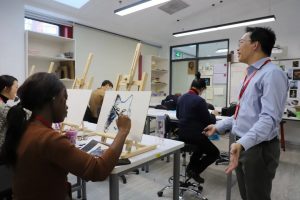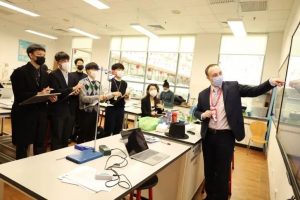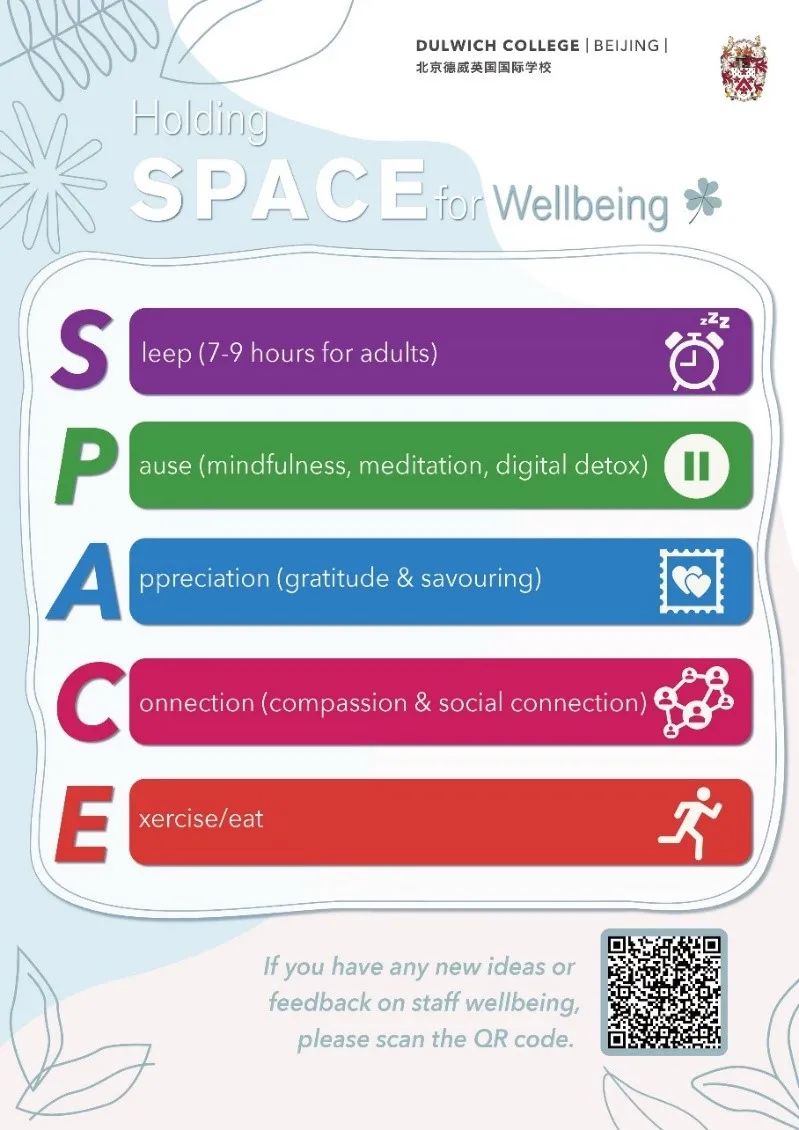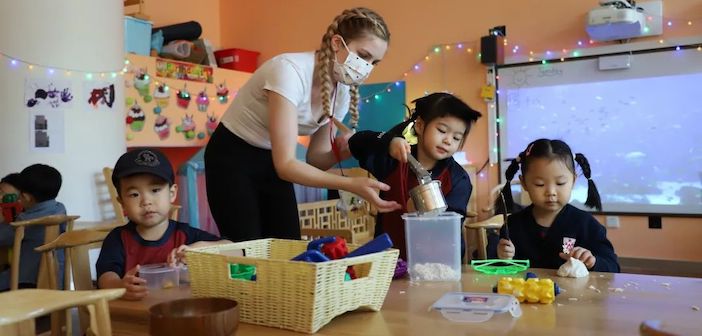In the early months of 2019, as the world became aware of Covid-19, the feeling was this was going to be a short-lived inconvenience. Little did any of us predict the extraordinary marathon of uncertainty that this would become, impacting everyone’s learning, work, and life. A sector particularly hard hit has been education, as schools grapple with constantly changing circumstances, fear, isolation from friends, family and the familiar all whilst trying to ensure a consistent schooling experience for their students.
We are proud to say that everyone in the Dulwich College Beijing (DCB) community has been doing a fantastic job working through many unprecedented challenges and accomplished impressive achievements. Our students have exhibited a high level of resilience and independence in their learning. Our parent community have provided the College with strong support. Last but not the least, our DCB staff have responded to many emergent scenarios quickly and effectively to continue to provide an excellent learning experience and maintain high standards of Health and Safety.

As the pandemic lingered for over two years, staff wellbeing has surfaced as a major priority for the College’s consideration. The wellbeing of the entire DCB community has always been important and the College has organised various programmes to address that topic in the past years. All of the teachers and administrative staff members have been under intense pressure dealing with multiple challenges and the now sadly familiar travel restrictions have prevented some families to reunite regularly, sometimes for more than two years. Added to the ongoing uncertainties and the fast-changing environment, this mental discomfort has cumulated over time, resulting in additional mental pressure.
Dulwich School Beijing has been acutely aware of the importance of prioritising and supporting staff wellbeing, recognising that the positive reverberations of this would be felt throughout the broader school community. A stable and healthy Staff community is not only critical for the College’s sustainable development but also the cornerstone for the world-class education that DCB is renowned for.

“We appreciate that our greatest asset is the Staff that serve our community,” said Anthony Coles, Head of College at Dulwich College Beijing. “Our priority is to have a happy, healthy, and productive Staff. We expect our teachers to promote a love of learning and student wellbeing, and we aim for every staff member to demonstrate professional initiative and perseverance so that they co-build a culture of communications, flexibility, and compassion for students to nurture a similar set of skills and mindset. Achieving that goal in the middle of the pandemic is not an easy task. We need to take Staff’s wellness to the next level and provide everyone with opportunities for coping with stress and uncertainty.”
The first step was to form a staff wellbeing committee with voluntary representatives from Early Years, Junior School, Senior School, and support staff departments. From the start of the academic year of 2020, the wellbeing committee met every term with the Head of College and the Director of Business Administrator. The representatives brought forward key concerns and recommendations they have heard among the Staff, and the meeting minutes were further brought to the College Leadership Team’s meetings for discussion and actions.


“According to Catherine Mc Caw, member of the wellbeing committee, “the pandemic has ignited an unprecedented level of uncertainty that in turn, has caused a mental burden to everyone. Fixing the pandemic is beyond our control, but we can focus on matters we can control and find ways to alleviate the symptoms and carve out some extra mental space. Our mission is, therefore, to help our colleagues and families to enhance their wellbeing and mental health, for example by crafting opportunities for everyone to make new friends and try new activities.”
To create a strategic and well-rounded staff wellbeing framework, DCB reached out to Dr Tabitha Healey, Executive and Organisational Coach in Australia. Dr Tabitha has 20 years of experience as a Medical Oncologist, specialising in the care of young women with breast and ovarian cancer. Caring for the terminally ill provides extraordinary insights into how people respond to incredible challenges. This led to her passion for wellbeing and a career shift to Executive and Personal Coaching, assisting people to live their best lives, whatever is thrown at them. “Whilst stress is inevitable in life, we can take control of our personal wellbeing and our response to stress. The most effective strategies to achieve this are all free, simple and easily accessible, it is just a matter of whether we make them a priority.”

The below contents have been provided by Dr Tabitha Healy addressing the SPACE framework that she has helped DCB to build and implement:
Wellbeing is defined as not merely the absence of disease but optimisation of a person’s physical, mental, emotional and social health. It is undeniable that stress levels have soared in recent years: pressure of time, pressure to compete and perform, erosion of work/life boundaries and now, the addition of a pandemic. We are seeing soaring rates of burnout and compassion fatigue in the caring professions. Whilst some stressors can be addressed by reviewing priorities and adjusting expectations, many are fixed. The response in this setting needs to be an investment in wellbeing, which then resets how an individual responds to the stressors to which they are exposed.
The body of research for boosting wellbeing and enhancing stress resilience is vast, to streamline this for Dulwich College Beijing we created the S.P.A.C.E program based on the 5 pillars of:
- Sleep
- Pause (mindfulness meditation and digital detoxification)
- Appreciation
- Compassion and connection
- Energy (Exercise and Eat)

A series of lectures on each of these pillars allows staff to learn the science behind why the investment in each of these simple strategies is achievable and worthwhile. Behavioural change is then encouraged by participation in follow-up activities, all whilst strengthening community through group participation.
Each of these pillars has been demonstrated to downregulate stress hormones, improve the way our brain functions and reduce long term wear and tear on our DNA thus reducing ageing and illness. They are all free, simple and readily accessible, it simply comes down to whether we make them a priority or not.
- So, what are the shifts that you can make to overhaul your wellbeing and strengthen your ability to tolerate stress and uncertainty? Sleep is vital and a routine essential. Where possible going to sleep and getting up at the same time each day, aiming for 7-9 hours and exposing yourself to 10 minutes of natural light in the morning will transform the quality of your sleep and set you up for the day.
- Pausing to take 10-15 minutes out to sit quietly with your thoughts, allowing them to pass and then return to focussing on your breath has been demonstrated to reduce stress, anxiety and depression, increase concentration and creativity and remarkably improve immune function and reduce pain. The greatest barrier to achieving quiet is our relationship with technology and I implore you to review how you interact with your devices: are you actively engaged online or simply mindlessly scrolling? Research reports that we check our phones every 12 minutes, we spend 5 minutes sorting a task and it then takes 23 minutes to return to our previous level of productivity, so in fact, we are never actually achieving optimal performance.
- Appreciation of what we have rather than what we don’t and expressing gratitude for this, increases life satisfaction, improves relationships and reduces toxic emotions and stress. Write down 3 things for which you are grateful before bed, share gratitude with family and friends or take a photo each day that allows you to savour the simple things for which we are all grateful. As you practice gratitude you will find that, like exercising a muscle, it becomes easier, stronger and your natural state.
- We are all hardwired for connection, love and belonging. Shockingly, loneliness (a lack of meaningful relationships) has been estimated to shorten life span by 15 years and has higher mortality than smoking, diabetes or obesity due to the release of the stress hormone cortisol and the impact this has on the body. When we are overwhelmed and stressed often the first thing we do is withdraw from human interaction, which sadly only exacerbates our distress. Rewarding human connections require a foundation of compassion, which is the understanding of another’s experience and providing assistance. It is compassion that makes the unbearable, bearable so look at your week and build in opportunities to be kind to yourself and connect compassionately with others.
- Finally, we turn to energy, and we all know what it feels like to let our batteries run low and yet I am reasonably confident that you would not allow that to happen to your phone. In order to thrive, we need to replenish our energy, and this requires regular exercise and appropriate fuel. Schedule a moderate-intensity exercise at least 3 times per week for 45 minutes, or 3 x 15minute sessions of high intensity, interval training. If you can, take your exercise outdoors as connecting with nature amplifies the benefits. Fuel your body with real food, preferably whole grain and plant-based, full of colour and variety.
Congratulations must be given to the Dulwich College Beijing Wellbeing Committee who have embraced the programme and have already provided extraordinary opportunities for the staff to expand their minds, connect with others and invest in themselves.

Based on the SPACE framework, DCB has designed and implemented a series of programmes engaging staff across the whole college. Members of staff wishing to do so could join any of the weekly counselling sessions introduced in November 2021 and led by professional psychologists. A wide range of activities have also been organised after school hours to enhance physical activity and social connections, especially during the festive holiday seasons when many staff members are not able to gather with their families outside Beijing or overseas. 26 staff members across the school have undertaken Mental Health First Aid training to ensure that anyone who is struggling can be recognised and supported. Last but not least, a communications etiquette has been shared across the whole community to minimize non-essential emails beyond working hours and respect our staff’s personal time so they can recharge for the next day.

It is worth mentioning that DCB parents have also extended great empathy and support to DCB staff by organising end-of-year teacher appreciation lunches and the now traditional Chinese New Year hongbao distribution to show appreciation to the third-party staff including cleaners, bus drivers, bus monitors, security guards, gardeners, and workers.
Images: Dulwich College of Beijing




